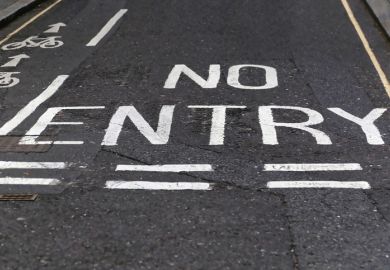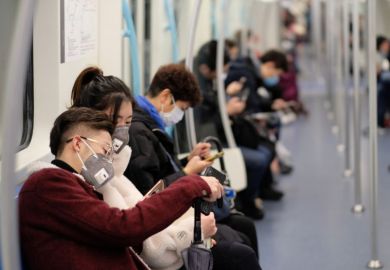A New Zealand vice-chancellor has broken ranks with many of his Antipodean colleagues, declaring that the coronavirus-related travel bans causing massive disruption to international enrolments are both unnecessary and counterproductive.
Victoria University of Wellington vice-chancellor Grant Guilford said restrictions such as New Zealand’s and Australia’s refusal to accept people flying in from China would not prevent the pathogen’s spread, and could actually hamper efforts to control the disease.
Such policies encouraged people to hide their travel history or to take “covert” routes, undermining efforts to track infected people and those exposed to them, Professor Guilford said. Travel bans also encouraged countries to under-report their case numbers – compromising global risk management − and prevented health professionals, medicine, supplies and equipment from reaching the outbreaks.
“The economic damage resulting from travel bans is significant, and they are capable of stigmatising entire races of people: in the case of coronavirus, those of Asian heritage,” Professor Guilford wrote in an article posted on Wellington’s website.
“The imposition of travel bans is perhaps the most commonly misused intervention.”
Professor Guilford’s views contrast with those expressed by vice-chancellors and university representatives across the Tasman Sea, who have backed the Australian government’s decision to follow its health experts’ advice to institute and extend the ban.
UNSW Sydney vice-chancellor Ian Jacobs, a doctor and medical researcher by training, said these sorts of issues were best left to experts “at the coalface” of public health. “I have enormous sympathy for the massively complex decision-making that the chief medical officers are having to make in guiding the politicians about this decision. Health and safety are paramount, [and] there are other factors they need to weigh,” he said.
But Professor Guilford, whose background is in veterinary science, characterised travel bans as a “sleight of hand” that compromised disease control.
They were sometimes motivated less by public health objectives than by “legal obligations and economic consequences overlaid with domestic and international politics”, he said.
“Research has suggested that governments anticipating high domestic political benefits from imposing barriers during an outbreak will likely do so. The imposition of travel bans is particularly likely in democracies with weak health infrastructure – a combination of circumstances that creates significant risk for politicians eyeing re-election…Some governments have been tempted to disguise political objectives as public health decisions,” he added.
Meanwhile, a US corporate adviser based in China has highlighted differences in government responses to the current outbreak, which originated in Wuhan, and the 2009 pandemic caused by an H1N1 viral strain that emerged in California 11 years ago.
Mario Cavolo, a former faculty member with Hult International Business School in Shanghai, said H1N1 had caused almost 300,000 deaths globally. The US authorities had taken six months to declare a national emergency, he wrote on the social media site LinkedIn.
“Did any government…send out a notice to its citizens that they should leave the United States? Close their borders to American travellers?
“I am reading vicious attacks on the Chinese government for their supposed intentional conspiracy to intentionally under-report the number of infections, yet that is always the case with such flu outbreaks no matter what country. The US H1N1 swine flu numbers were vastly underestimated and updated three years later, because that is the nature of such viral outbreaks which don’t care which country they started in.”
Register to continue
Why register?
- Registration is free and only takes a moment
- Once registered, you can read 3 articles a month
- Sign up for our newsletter
Subscribe
Or subscribe for unlimited access to:
- Unlimited access to news, views, insights & reviews
- Digital editions
- Digital access to THE’s university and college rankings analysis
Already registered or a current subscriber?










